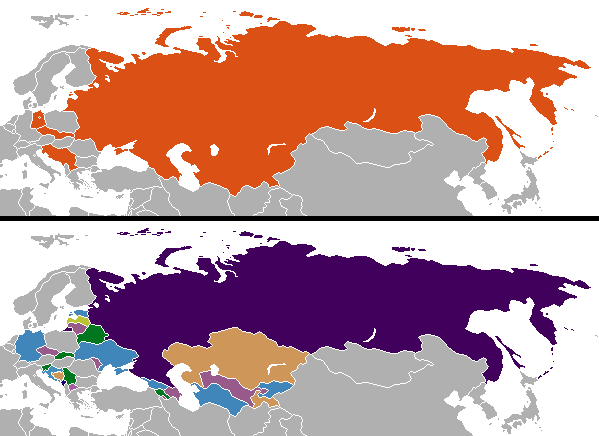
Post–Cold War era
The post–Cold War era is a period of history that follows the end of the Cold War, which represents history after the dissolution of the Soviet Union in December 1991. This period saw many former Soviet republics become sovereign nations, as well as the introduction of market economies in eastern Europe. This period also marked the United States becoming the world's sole superpower.
For the main trends, see International relations since 1989.
Relative to the Cold War, the period is characterized by stabilization and disarmament. Both the United States and Russia significantly reduced their nuclear stockpiles. The former Eastern Bloc became democratic and was integrated into world economy. Most of former Soviet satellites and three former Baltic Republics were integrated into the European Union and NATO. In the first two decades of the period, NATO underwent three series of enlargement and France reintegrated into the NATO command.
Russia formed CSTO to replace the dissolved Warsaw Pact, established strategic partnership with China and several other countries, and entered the non-military organizations SCO and BRICS. Both latter organizations included China, which is a fast rising power. Reacting on the rise of China, the Obama administration rebalanced strategic forces to the Asia-Pacific region.
Major crises of the period included the Gulf War, Yugoslav Wars, the First and Second Congo Wars, First and Second Chechen War, September 11 attacks, War in Afghanistan (2001–2021), Iraq War, Russo-Georgian War and the ongoing Russo-Ukrainian War. Two other ongoing wars, the Syrian Civil War and the 2023 Israel-Hamas War, are widely described as a series of overlapping proxy wars between the regional and world powers, primarily between the US and Russia.
With the coming to power of Vladimir Putin, Russia gradually became more authoritarian and its foreign policy more aggressive. This resulted in deterioration of relations with the Western world. The deterioration culminated with sanctions, military aid to Ukraine, international isolation, and a prospect of further NATO enlargement.